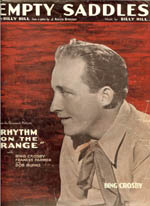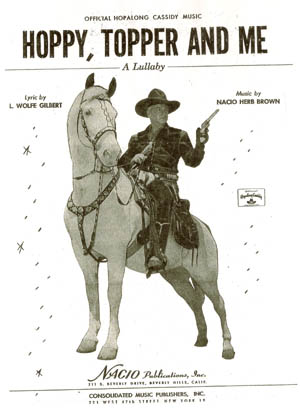
![]()
This is another in the series celebrating one songwriter
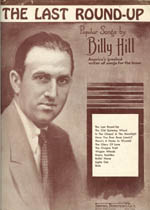
"The Last Round-Up"
A Tribute to Songwriter Billy Hill
- Early Years
- Song Hits
- Movie Songs
- Final Year
- CD: "The Last Round-Up - Songs by Bill Hill
- Multimedia books with music files
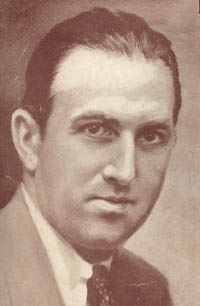
Back in 1940, one of the best known pop songwriters of that time lost his battle with alcohol abuse and died of heart failure. At one time he was the toast of the music world. But the drinking and marital problems had caught up with him. Today he is known for his many fine western songs.
Early Years
His full name was William Joseph Hill and he was born in Boston on July 14, 1899. His family lived at No. 3 May Street in Jamaica Plain. His father George was a sea captain and his mother Mary was a Jewish immigrant from Latvia. When he was very young his family moved to Weymouth, Massachusetts.
In high school he had two extracurricular pursuits: playing football and playing his fiddle. He was offered a football scholarship at Harvard but turned it down to study violin at the New England Conservatory of Music, where he studied with Karl Muck, then the conductor of the Boston Symphony Orchestra. The young violinist became so proficient that he played in the BSO for a short time. He was headed for a promising career as a classical musician but the thought of sowing his wild oats in the wide open spaces was too great for him.
So at the age of seventeen he went out West and spent the next fifteen years working at various jobs. His jobs included: a dishwasher in several roadhouses, a cowpuncher in Montana, a payroll clerk at a mining camp in Death Valley, and most unusual of all – he was a band leader at a Chinese restaurant in Salt Lake City, Utah. His jazz band was said to be the first one to perform in the West When he wrote his first songs, he used the pseudonym, George Brown, but later changed it to his real name of Billy Hill.
In a conversation with his daughter, Lee Hill Taylor, she said her father used the pseudonym because he didn’t want his name reversed to “Hill Billy.” At that time there was prejudice against anyone writing “hillbilly” songs since they were less sophisticated than the stylized pop songs of that time. Hill preferred to be known for writing good songs about the West. So he used George Brown until he had his first big hit. From then on he used his real name.
Billy Hill bought an old beat-up Model T Ford and decided he need to find himself a bride. So he walked into the lobby of a hotel and spotted an attractive young woman seated in the corner of the room. Her name was Dedette Lee Walker, an unemployed showgirl originally from Virginia. He walked up to her and announced he wanted to marry her. After she stopped laughing hysterically, she realized he didn’t look so bad after all. Then he told her he was driving back to New York to make his fortune as a songwriter. She had a hard time believing his story. He assured her of his sincerity and again asked her to marry him. This time she agreed and they were married right away. On the way to their wedding night destination in Yuma, Arizona, the last of the four flimsy Model T tires blew out and they spent the night in a ditch on the side of the road. Not a very romantic honeymoon. Since he was a budding songwriter, he sat up that night and penned the lyrics to a song for his new bride, which he titled appropriately, “The West, A Nest, and You.” This was set to music by Larry Yoell and first published in 1922 and then the following year by a different publisher. It was later sung by Gene Autry in his 1938 movie, PRAIRIE MOON.
The newlyweds eventually made their way to New York in that old Model T. Hill immediately set out to make the rounds of music publishers trying to sell his songs. He did sell one song titled, "They Cut Down The Old Pine Tree" (co-written by Willie Raskin and Edward Eliscu) and published in 1929. This was recorded by Gene Autry one year later. But Hill had trouble making money from any of his other songs so he was forced to look for other work.
He found a job as a doorman at the Essex Hotel on Fifth Avenue, and continued to write songs in his spare time. His wife, Dedette, tried to find work as a showgirl but the competition was intense during the Great Depression when so many were out of work. They were both struggling to survive and their luck finally ran out. The rent couldn't’t be paid and so the gas was turned off in their tiny Greenwich Village apartment. They were so poor that when Dedette was expecting their first and only child, she wasn't’t allowed to give birth it the hospital until her husband could show up with some money. By the time he arrived, she had delivered the baby girl in the hospital elevator. The baby was named Lee, after Dedette’s middle name, and was born in 1933.
Song Hits
Billy Hill was so desperate for money, he almost sold his best known song, “The Last Round-Up,” for just $25. Fortunately ASCAP President Gene Buck thought the song was so good, he loaned him $200 to hold him over until he could find a major publisher and get his song recorded. Hill immediately joined ASCAP. A few years later he testified before a Congressional Hearing Committee in Washington in support of ASCAP. He gave a very emotional testimony how he had survived as a songwriter thanks to the money given to him by Gene Buck.
"The Last Round-Up" was published by Shapiro & Bernstein in 1933. It became Hill’s biggest hit and was first recorded by George Olsen and His Orchestra, with a vocal by Joe Morrison. The song immediately shot up to No. 1 and stayed there for 9 weeks. Other hit recordings were made by Gene Autry, Bing Crosby, and Guy Lombardo. It was later recorded by The Sons of the Pioneers in 1947, and by Rex Allen, who had a hit with it in 1955.
Lee Hill Taylor told me how this famous western song was written by her father. It seems that while he was working on a ranch in Montana, he asked one of the cowboys why they continued to ride in a round-up when they got older. The cowboy told him there was a time when they had to stop and that would be their “last round-up.” Right after their brief conversation this cowboy was riding his horse and was accidentally knocked off and trampled to death. Hill never forgot that terrible accident and used it as the basis for his memorable song.
Another of his popular western songs was “Wagon Wheels,” with music by Peter DeRose. Both “The Last Round-Up” and “Wagon Wheels” were sung in the Ziegfeld Follies of 1934. This was the beginning of Billy Hill’s successful songwriting career.
Movie Songs
His songs were also used in all kinds of Hollywood movies, including the Betty Boop 1933 animated short, "The Old Man in the Mountain."
One of the earliest big hits was “Empty Saddles.” It was featured in Rhythm on the Range, a 1936 Paramount musical starring Bing Crosby, who sings the song with deep felt emotion. The song was later recorded by The Sons of the Pioneers, Johnny Bond, and more recently, Sons of San Joaquin. It’s now considered a western classic.
Besides the western songs, Hill also had several pop hits as well, including “In the Chapel in the Moonlight” and “The Glory of Love,” both written in 1936. “The Glory of Love” remains one of his most recorded songs. One of the first was made by Benny Goodman and His Orchestra with a vocal by Martha Tilton. Fifty years later, there was another hit version, this one by Bette Midler as featured in the movie, Beaches. Another of Hill’s hits was “On a Little Street in Singapore,” once again with music by Peter DeRose. It was made popular in 1939 by Harry James with a vocal by a young Frank Sinatra. This song was revived again in a jazzy arrangement by the Manhattan Transfer in 1978.Billy Hill’s last hit song was "Call of the Canyon"in 1940, recorded both by Glenn Miller and Tommy Dorsey with a vocal by Frank Sinatra. The song was used that year in a popular Gene Autry movie, MELODY RANCH. There was also a wonderful recording made of this song by Jimmy Wakely in the 1950s.
Even though he had much success with his songs, Billy Hill suffered from his troubled marriage and, in 1939, he separated from Dedette. His daughter said that “the problems came from heavy drinking on both their parts and professional jealousy on my mother’s part.” Dedette had written some songs of her own, such as “Old Folks” with music by Willard Robinson, and “Address Unknown,” with Carmen Lombardo and Johnny Marks.
Final Year
On September 24, 1940, Billy Hill performed at the Golden Gate Exposition in San Francisco. The evening concert was sponsored by ASCAP and hosted by Hill’s early benefactor, Gene Buck. Dozens of well known songwriters performed in that concert, including Irving Berlin, Hoagy Carmichael,
W.C. Handy, Jerome Kern, and Johnny Mercer.In his introduction, Buck said Billy Hill was
a big tall lumbering shy guy who will coo for you a song which I personally consider the greatest western cowboy folk tune ever written – The Last Round-Up.
Hill then sang his song in a simple and direct singing style. It was believed to be the last time he performed in public.
Billy Hill's performance is available on a wonderful 4 CD set with great American songwriters titled:
Three months later, on Christmas Eve in 1940, Billy Hill died of heart failure in a Boston hotel room.
He was only 42.
Lee Taylor said she visited her father just a few days before he died. She described him as being “really in bad shape.” Then she added that cowboy film star Hoot Gibson was also in the hotel room and “he was doing rope tricks for me to try and distract me while my mother was comforting my father.” It was a sad farewell for her dad and this popular songwriter.
Billy Hill was buried in the town where he grew up. In the Weymouth cemetery on Washington Street there is a large stone grave marker which has only one word. It just reads: “Hill.” There is no other information on that marker to indicate this is the final resting place of one of the greatest cowboy songwriters from the past.
As a tribute to her late husband, in 1941 Dedette wrote the lyrics for a song titled, “Who Calls?” The music was by Johnny Marks, who later became famous for the popular Christmas song, “Rudolph the Red-Nosed Reindeer.” At the top of the sheet music are the words: “Dedicated to Billy.” Dedette had paid her final respects to her songwriter husband. She then moved out to Burbank, California and she died there in 1950, ten years after her husband.
With their heavy drinking and marital problems, it had been a difficult life for this songwriting couple. Yet even with her professional jealousy, Dedette realized the greatness of her husband’s work.
I wrote the following in 1999, when Billy Hill was elected into the Western Music Association Hall of Fame:
His popular western songs have lived on through recordings made by Rex Allen, Gene Autry, Roy Rogers, Sons of the Pioneers, Jimmy Wakely, and many others. He may not have lived his whole life as a cowboy, but he certainly celebrated that lifestyle in his memorable songs which have contributed much to our western music heritage.
Decades ago he rode off on that “Last Round-up."
But the songs of Billy Hill will continue to be sung by those who want to remember the great songs of long ago.
-- Article by Roger Lee Hall, Cowboy Songs Corral
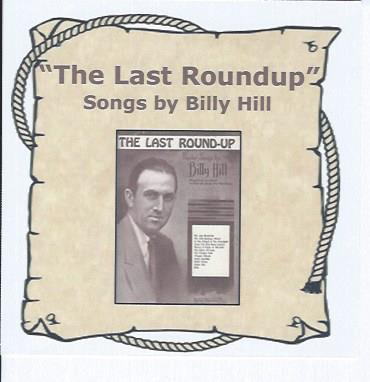
You can receive this Billy Hill Song Sampler CD
including such popular song hits as:
"Call of the Canyon"
"Empty Saddles,"
"The Glory of Love"
" In the Chapel in the Moonlight"
"The Last Round-Up"
"The Old Spinning Wheel"
"The Oregon Trail"
"Wagon Wheels"
"The Old Spinning Wheel"
"The Glory of Love"
This special CD is for personal, non-commercial use only.
Please help support the preservation mission of this web site.
You will receive this CD including shipping
for a donation of $25.
You can make your donation by credit card
payable to PineTree Productions,
through safe and secure PayPal.Click on this button to
After you have made your donation,
mention this CD title
and send your mailing address to:
"The Last Round-Up" Billy Hill CD
Related Links
See also these links:
"Back in the Saddle Again" -- Gene Autry Centennial Tribute
"Happy Trails" -- Roy Rogers Centennial Tribute
"High Noon" - Song and Score
Hopalong Cassidy Music"On the Banks of the Sunny San Juan" -- Eddie Dean Centennial Tribute
"True Grit" -- John Wayne Centennial Tribute
See also these pages...
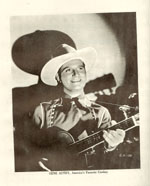
Help support the mission of this website
Order from the CAMP Store
© 2006 PineTree Productions. All Rights Reserved for material on this website.






